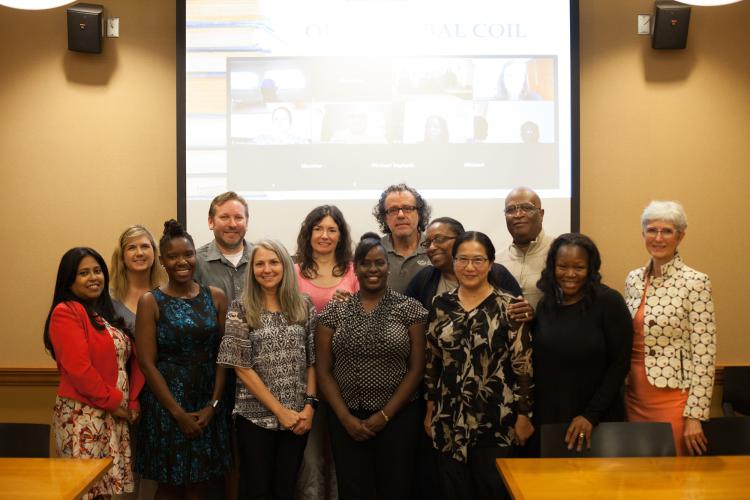

Ohio University’s Office of Global Affairs and International Studies, with the support of the Deans, Regional Campuses and more than 12 international partners, kicked off the Global COIL Initiative (GCI) on Monday, Sept. 16.
The initiative is led by the Center for International Studies with the support of the Office of Instructional Innovation and Regional Higher Education.
The GCI is an opportunity for faculty and teaching staff who want to connect their students with other students around the globe and across disciplines on joint projects using internet technology and social media, otherwise referred to as Collaborative Online International Learning (COIL).
This initiative will also introduce faculty to a network of colleagues from across the colleges and disciplines at Ohio University and 12 partners from Africa, Asia, Europe and Central America. More than 40 faculty are participating.
The GCI is a three-year program where participants will develop and teach a COIL class at least twice during the three years with an international collaborator. The aim is to create learning environments for participants to broaden and deepen their understanding of COIL course content and options while building cross-cultural relationships through academic and personal engagement enhanced by the perspectives of their global peers.
In today’s digital world, it is more important than ever that we take advantage of every opportunity for connecting our students with students from around the world for academic and career development. With COIL, it is possible, and the results are transformative. This initiative leads both faculty and students in new directions often uncharted as they explore the possibilities for working on joint projects through virtual technology. Recent evaluation of COIL projects has indicated students are more interested in studying abroad and that they experienced more personal, professional and intercultural growth (Reed, 2016).
“Students often see a whole new lens on the world and on the subject matter they are studying by virtue of working together, listening, learning and sharing with a partner from another culture, possibly another discipline, and who may speak a different language. COIL has far reaching implications for enhancing teaching in an academic setting. Also, COIL is fun, it’s interesting, it’s different, and it’s challenging. And most of all, it is an opportunity for making new friends in other countries” said LJ Edmonds, vice provost for global affairs and international studies and director of the Center for International Studies.
To kick off the GCI, participants will join a learning community course to explore basics on how to COIL and increase competencies for using technology in practical and impactful ways. They will also attend a COIL Symposium/Training workshops on the Athens campus, Oct. 21-24 before heading to the International Virtual Exchange conference in Tacoma, Washington, Oct. 25-26.
The four session learning community (LC) that started on September 16 will train both OHIO and faculty from our international partner institutions how to COIL a course. While the OHIO faculty will be present face to face, the international faculty will join us via Zoom. This is the first time such a unique LC has been designed to maintain the equity of relationship between our partners in terms of knowledge, skills and availability of resources. The LC will also pair OHIO faculty with the international faculty and both will have the opportunity to work with each other when the international faculty visit OHIO in October.
The current COIL cohort includes faculty and staff members from the following universities:
- University of Botswana- Botswana
- Pontifical Catholic University of Ecuador (PUCE)- Ecuador
- Leipzig University-Germany
- University of Cape Coast, University of Ghana-Legon and Garden City University College - Ghana
- Gopikabai Sitaram Gawande College - India
- Chubu University- Japan
- Kenyatta University- Kenya
- Universiti Putra Malaysia (UPM)- Malaysia
- Rhodes University and Stellenbosch University- South Africa
- King Mongkut's University of Technology Thonburi – Thailand
It is important to have an instructional designer/technologist help navigate the development of engaging and effective learning experiences while taking into consideration all of the different assets of selected technology tools based on the different types of learners and the location of students. An instructional designer/technologist can help the faculty partners determine common projects that meets their individual course goals and objectives as well as construct a learning evaluation method that is most effective for both partners.
COIL is ideal as there are minimal costs as classrooms are connected via the internet so no travel costs for students are necessary and there are no credit transfer or curriculum modification as assignments are part of an existing course. The hope is participants will use this opportunity to incorporate in their collaborative projects a focus on sustainability in line with the UN 2030 Sustainable Development Goals (SDGs) , Ohio University’s Strategic Pathways and Priorities , and the issues that affect the communities in which we reside and work locally that could benefit from a shared international perspective.
For additional information regarding the GCI, contact COILOhio@ohio.edu .

